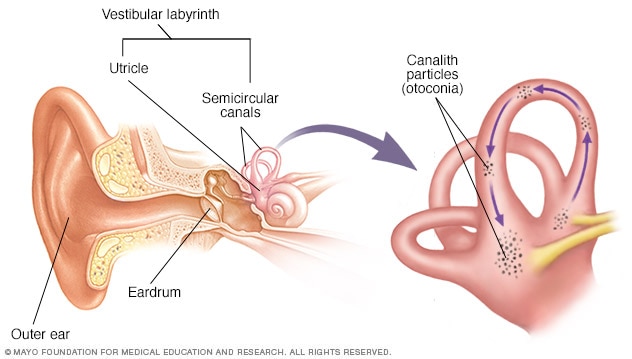
Benign Paroxysmal Positional Vertigo (BPPV)
Have You Ever Felt Dizzy?
It’s normal to feel disoriented in space for a few seconds for example, after you get off a rollercoaster ride.
However, if you feel frequent bouts of dizziness (whether it’s for seconds or days at a time), then it is very likely you have an issue with your balance system. One of the systems the human body uses to keep balance is the vestibular system, which includes parts of the inner ear and the brain that help control balance and eye movements.
It can be damaged by viral infections, lack of blood flow to inner ear, aging, or medications. If the vestibular system is impaired, you could experience symptoms including dizziness, imbalance or vertigo.

Benign Parosysmal Positional Vertigo (BPPV), the most common cause of vertigo, is a mechanical problem in the inner ear. Tiny calcium ‘crystals’ in your inner ear organs help you keep your balance. Normally, when you stand up and move around, the crystals move and prompt signals to tell your brain where you are in space. Sometimes, these crystals move into an area of your inner ear called the semicircular canals, where they are not supposed to be. When you move your head in certain ways, the crystals in the canals move. The crystals trigger sensors in the semicircular canal, which sends false signals to the brain causing you to feel a spinning sensation.
BPPV is triggered by head movements, and usually lasts seconds to less than a minute. You can have symptoms range from mild to severe enough to cause nausea, vomiting, a loss of balance and falling.
How is BPPV diagnosed?
Your doctor or physiotherapist can determine if you have BPPV by asking you questions about your vertigo and doing a physical examination. Patients with BPPV have eye flickering movements (nystagmus) that health care professionals can observe to figure out which canals the crystals are located in for treatment. There are also other causes of vertigo, not caused by BPPV that require further testing.
Treatment
Your doctor or physiotherapist can treat BPPV with certain body re-positioning procedures to move the crystals back to their origin to be reabsorbed. Medicine may help with severe nausea and vomiting. General practitioners typically refer patients to a medical professional specifically trained to deal with vestibular disorders, most commonly a vestibular rehabilitation therapist (usually a trained physiotherapist) or an ENT (Ear, nose, throat doctor). Specific exercises can also be prescribed to train your brain to adjust to the confusing vertigo signals.
Having dizzy spells? See a physiotherapist today and have a vestibular assessment done!
